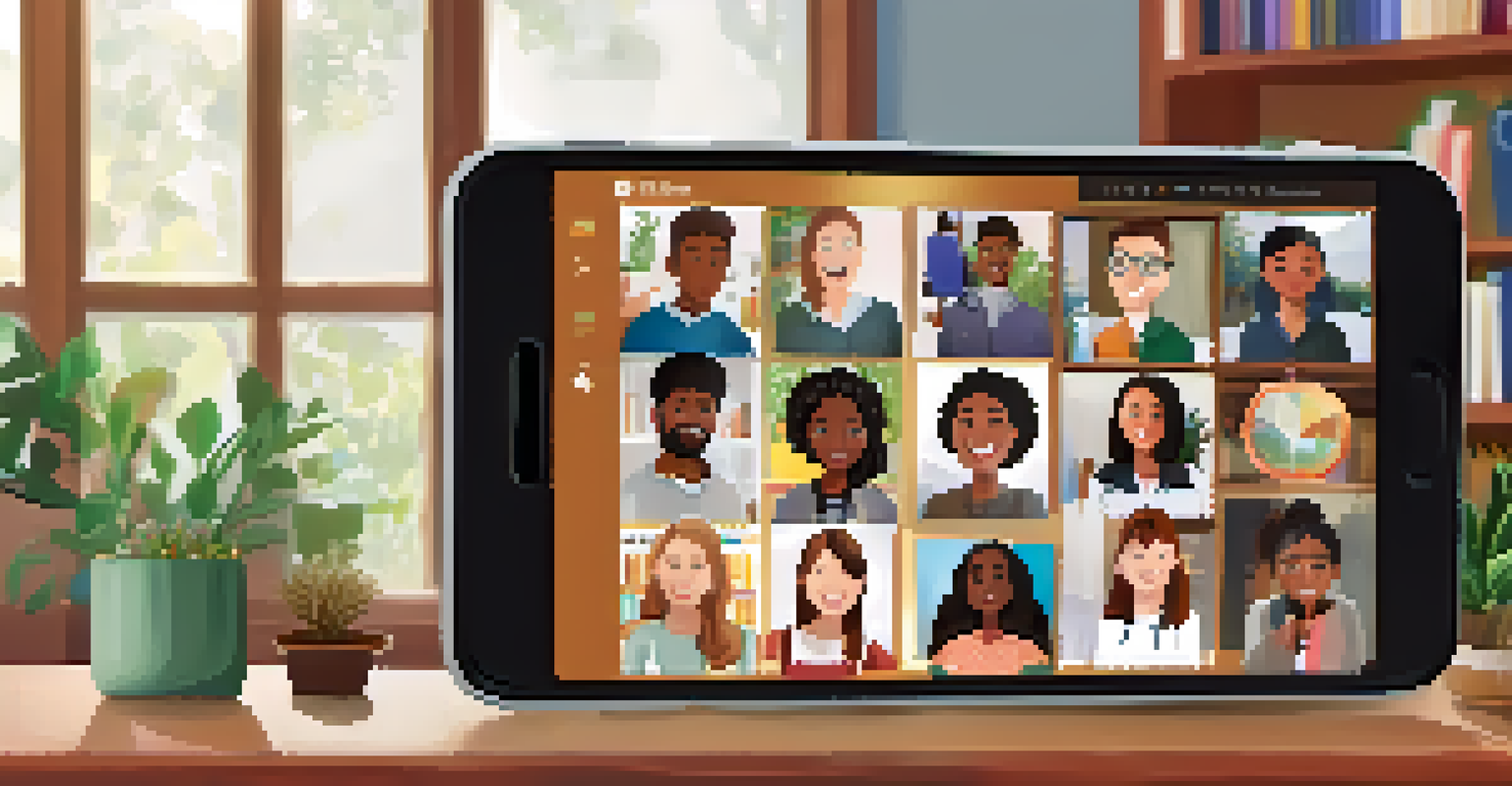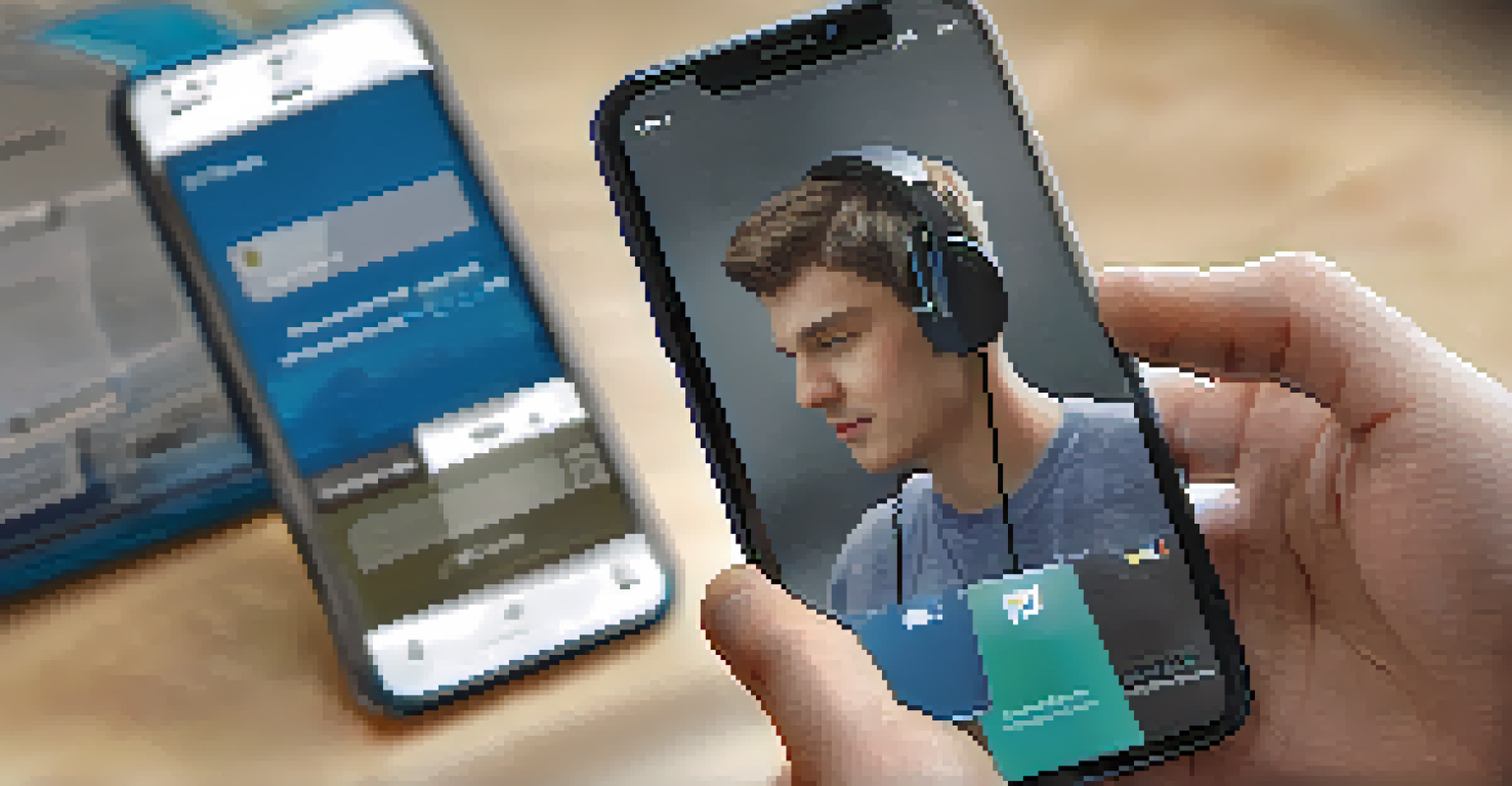The Impact of Mobile Learning on Lifelong Learning Opportunities

Mobile Learning: A New Frontier in Education
Mobile learning, or m-learning, refers to the use of mobile devices to access educational resources anytime and anywhere. This flexibility allows learners to engage with content in a way that fits their lifestyle, making education more accessible than ever before. Just think about how you can watch a lecture while waiting for your coffee or study for an exam during your daily commute. This shift towards mobile platforms is revolutionizing how we approach lifelong learning.
Education is the most powerful weapon which you can use to change the world.
In this digital age, the traditional classroom is no longer the only place to learn. With just a smartphone, a world of knowledge is at our fingertips, from online courses to educational apps. This convenience empowers individuals to take charge of their learning journey, regardless of their location or schedule. Imagine a busy parent who can study during nap time or a working professional who can enhance their skills during lunch breaks.
As mobile learning continues to evolve, it opens doors for diverse learning experiences that cater to different preferences and needs. Whether it’s through interactive quizzes, video tutorials, or virtual reality simulations, the variety available makes learning engaging and effective. In essence, mobile learning not only fosters knowledge acquisition but also encourages a culture of continuous education.
Breaking Down Barriers to Education
One of the most significant impacts of mobile learning is its ability to break down geographical and economic barriers. Traditionally, access to quality education was often limited to those in urban areas or those who could afford it. Now, with mobile technology, even individuals in remote or underserved regions can access high-quality educational resources through their devices. This democratization of learning is a game-changer.

Consider a student living in a rural area who dreams of pursuing a career in technology. With mobile learning, they can access online coding bootcamps, watch tutorials, and participate in forums with industry professionals—all from their phone. This level of access means that aspiring learners no longer have to relocate or incur hefty expenses to gain valuable skills.
Mobile Learning Enhances Accessibility
Mobile learning democratizes education, breaking geographical and economic barriers, allowing anyone with a smartphone to access quality resources.
Moreover, mobile learning supports diverse learning pathways, allowing learners to choose what, when, and how they study. This personalized approach not only enhances engagement but also caters to different learning styles. The result? A more inclusive educational landscape where everyone has the opportunity to thrive.
Fostering Lifelong Learning Mindsets
Mobile learning encourages a culture of lifelong learning, where education doesn’t stop after formal schooling. With easy access to resources, individuals are more likely to seek out new knowledge and skills throughout their lives. This mindset is crucial in today’s fast-paced world, where technology and job markets are constantly evolving. Think of lifelong learning as a journey, where each effort builds upon the last, creating a richer understanding of the world.
The beautiful thing about learning is that no one can take it away from you.
For instance, professionals can take advantage of mobile learning to stay updated in their field or pivot to a new career path. Online platforms offer a plethora of courses on everything from digital marketing to data analysis, all accessible via mobile devices. This adaptability not only enhances career prospects but also fosters personal growth.
Additionally, the gamification of learning—using game elements in educational contexts—has become a popular trend in mobile learning. This approach makes learning fun and engaging, encouraging learners to continuously pursue new challenges and knowledge. As a result, individuals develop a proactive attitude toward education, viewing it as an integral part of their lives.
Enhancing Accessibility for Diverse Learners
Mobile learning's impact extends to creating accessible educational opportunities for diverse populations, including those with disabilities. Many educational apps and platforms offer features like text-to-speech, closed captions, and adjustable font sizes, making learning more inclusive. This ensures that everyone, regardless of their learning needs, can benefit from mobile education.
For example, students with visual impairments can use mobile apps that describe visual content aloud, allowing them to engage with materials they might otherwise find challenging. This level of accessibility fosters a sense of belonging and empowerment among learners who may have previously felt excluded from traditional learning environments.
Fostering Lifelong Learning Cultures
By providing easy access to educational resources, mobile learning encourages a mindset of continuous education throughout one's life.
Furthermore, mobile learning can facilitate language acquisition for non-native speakers. Many apps provide language lessons and practice tools that learners can access on the go, helping them improve their skills at their own pace. This not only enriches their personal and professional lives but also promotes cultural exchange and understanding.
The Role of Community in Mobile Learning
Community engagement plays a vital role in enhancing the mobile learning experience. Online forums, social media groups, and study communities allow learners to connect with others who share similar interests and goals. This sense of belonging can motivate individuals to pursue their learning objectives and hold each other accountable. Think of it as a virtual study group, where everyone can support one another.
Additionally, mobile learning platforms often include collaborative features, enabling users to share resources, insights, and feedback. This not only enriches the learning experience but also helps build a network of like-minded individuals. For instance, a group of learners can work together on projects or discuss course materials, fostering a deeper understanding of the subject matter.
The power of community also extends to mentorship opportunities. Learners can connect with industry professionals who can provide guidance and advice. This access to mentorship can be invaluable, especially for those looking to navigate their career paths or explore new fields.
Challenges and Considerations of Mobile Learning
While mobile learning offers numerous benefits, it also comes with its own set of challenges. One of the primary concerns is the digital divide—disparities in access to mobile technology and the internet. Not everyone has a smartphone or reliable internet connection, which can hinder their ability to engage in mobile learning. Addressing this issue is crucial to ensure that all learners can take advantage of these opportunities.
Another challenge is the potential for distractions that mobile devices can bring. With social media notifications and games just a tap away, maintaining focus can be difficult. It’s important for learners to develop self-discipline and create a conducive learning environment to get the most out of their mobile education experience.
Community Supports Learning Engagement
Engagement in online communities enhances the mobile learning experience, allowing learners to connect, collaborate, and find mentorship.
Finally, the quality of mobile learning resources can vary widely. As more content becomes available, distinguishing between high-quality materials and subpar ones can be daunting. Learners should seek out reputable platforms that offer well-structured courses and credible instructors to ensure they receive valuable education.
The Future of Mobile Learning in Lifelong Education
As technology continues to advance, the future of mobile learning looks promising. Innovations like augmented reality (AR) and artificial intelligence (AI) are poised to transform the way we learn. Imagine using AR to visualize complex concepts or AI-driven platforms that adapt to your learning style. These advancements will likely create even more engaging and personalized learning experiences.
Moreover, as global connectivity improves, more learners around the world will gain access to mobile education. This could lead to a more educated workforce, boosting economic growth and social development in various regions. The potential for mobile learning to positively impact communities is immense, fostering a culture of continuous improvement.

Ultimately, the future of mobile learning is about harnessing technology to empower individuals to take charge of their education. As we embrace this new frontier, it’s essential to prioritize accessibility, quality, and community engagement. By doing so, we can ensure that mobile learning becomes a cornerstone of lifelong learning opportunities for everyone.